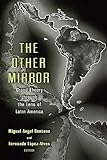The Other Mirror : Grand Theory through the Lens of Latin America / ed. by Fernando López-Alves, Miguel Angel Centeno.
Material type: TextPublisher: Princeton, NJ : Princeton University Press, [2022]Copyright date: ©2001Description: 1 online resource (384 p.)Content type:
TextPublisher: Princeton, NJ : Princeton University Press, [2022]Copyright date: ©2001Description: 1 online resource (384 p.)Content type: - 9780691222561
- Social sciences -- Philosophy
- Social sciences -- Latin America -- Philosophy
- SOCIAL SCIENCE / Ethnic Studies / General
- Allende, Salvador
- Avellaneda, Nicolás
- Bauer, Arnold
- Betancourt, Rómulo
- Bolivia revolution
- Brazil Empire
- Castro, Fidel
- Centeno, Miguel
- Chiapas peasant revolt (Mexico)
- Chilean Constitution of 1833
- Crosby, Alfred
- Economist
- Eden imagery
- Freud, Sigmund
- Grindle, Merilee
- Hamilton, Richard
- Jenkins, Henry
- Juárez, Benito
- Keynesian school
- Korea
- Landless Movement
- Leninist party (Cuba)
- Malinowski, Bronislaw
- Marichal, Carlos
- Meyer, John
- New Jerusalem massacre
- Nicaragua
- North, Douglass
- Oribe, Manuel
- Osterreichische Volkswirt journal
- Owens, Robert
- Papia, Primo
- Pietschmann, Horst
- Poland
- Romania
- Russian Revolution (1917)
- Saravia, Aparicio
- Singer, Hans
- Stalinism state
- Taussig, Michael
- Thatcher, Margaret
- Tinsman, Heidi
- agent state type
- dependentistas
- doux commerce image
- fascism state
- homesteading practice
- institutional rules
- moral economy
- nacional
- national identity
- protectionism
- reciprocity
- H53.L3
- online - DeGruyter
| Item type | Current library | Call number | URL | Status | Notes | Barcode | |
|---|---|---|---|---|---|---|---|
 eBook
eBook
|
Biblioteca "Angelicum" Pont. Univ. S.Tommaso d'Aquino Nuvola online | online - DeGruyter (Browse shelf(Opens below)) | Online access | Not for loan (Accesso limitato) | Accesso per gli utenti autorizzati / Access for authorized users | (dgr)9780691222561 |
Frontmatter -- CONTENTS -- PREFACE -- CONTRIBUTORS -- INTRODUCTION -- PART I: CREATING AN ECONOMY -- Chapter One INSTITUTIONS, PROPERTY, AND ECONOMIC DEVELOPMENT IN LATIN AMERICA -- Chapter Two HIJOS OF DR. GERSCHENKRON: "LATECOMER" CONCEPTIONS IN LATIN AMERICAN ECONOMIC HISTORY -- Chapter Three KARL POLANYI AND THE CREATION OF THE "MARKET SOCIETY" -- Chapter Four FROM THE POWER OF ECONOMIC IDEAS TO THE POWER OF ECONOMISTS -- PART II THE STATE AND DEMOCRACY -- Chapter Five THE TRANSATLANTIC BRIDGE: MIRRORS, CHARLES TILLY, AND STATE FORMATION IN THE RIVER PLATE -- Chapter Six THE MODERN MEXICAN STATE: THEORY AND PRACTICE -- Chapter Seven SAMUEL HUNTINGTON AND THE LATIN AMERICAN STATE -- Chapter Eight CLASS RELATIONS AND DEMOCRATIZATION -- PART III LIVING AND BELONGING -- Chapter Nine THE DISCIPLINARY SOCIETY IN LATIN AMERICA -- Chapter Ten MICHEL DE CERTEAU AND LATIN AMERICA -- Chapter Eleven NATIONALISM AS A PRACTICAL SYSTEM -- INDEX
restricted access online access with authorization star
http://purl.org/coar/access_right/c_16ec
If social science's "cultural turn" has taught us anything, it is that knowledge is constrained by the time and place in which it is produced. In response, scholars have begun to reassess social theory from the standpoints of groups and places outside of the European context upon which most grand theory is based. Here a distinguished group of scholars reevaluates widely accepted theories of state, property, race, and economics against Latin American experiences with a two-fold purpose. They seek to deepen our understanding of Latin America and the problems it faces. And, by testing social science paradigms against a broader variety of cases, they pursue a better and truly generalizable map of the social world. Bringing universal theory into dialogue with specific history, the contributors consider what forms Latin American variations of classical themes might take and which theories are most useful in describing Latin America. For example, the Argentinian experience reveals the limitations of neoclassical descriptions of economic development, but Charles Tilly's emphasis on the importance of war and collective action to statemaking holds up well when thoughtfully adapted to Latin American situations. Marxist structural analysis is problematic in a region where political divisions do not fully expresses class cleavages, but aspects of Karl Polanyi's socioeconomic theory cross borders with relative ease. This fresh theoretical discussion expands the scope of Latin American studies and social theory, bringing the two into an unprecedented conversation that will benefit both. Contributors are, in addition to the editors, Jeremy Adelman, Jorge I. Domínguez, Paul Gootenberg, Alan Knight, Robert M. Levine, Claudio Lomnitz, John Markoff, Verónica Montecinos, Steven C. Topik, and J. Samuel Valenzuela.
Mode of access: Internet via World Wide Web.
In English.
Description based on online resource; title from PDF title page (publisher's Web site, viewed 29. Jul 2022)


